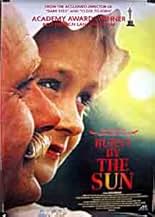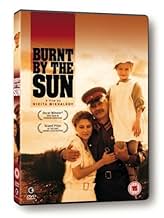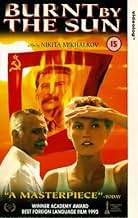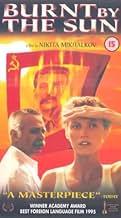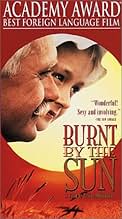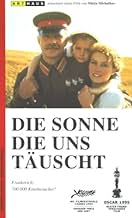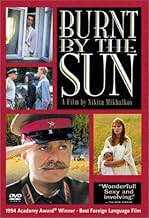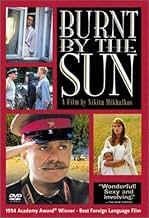CALIFICACIÓN DE IMDb
7.8/10
17 k
TU CALIFICACIÓN
Agrega una trama en tu idiomaIn the USSR in 1936, shadows of Stalin's repressions fall on a famous, revolutionary hero. The accusations of him being a foreign spy are nonsense, and everyone knows that. However, a slow p... Leer todoIn the USSR in 1936, shadows of Stalin's repressions fall on a famous, revolutionary hero. The accusations of him being a foreign spy are nonsense, and everyone knows that. However, a slow process of his downfall has already started.In the USSR in 1936, shadows of Stalin's repressions fall on a famous, revolutionary hero. The accusations of him being a foreign spy are nonsense, and everyone knows that. However, a slow process of his downfall has already started.
- Dirección
- Guionistas
- Elenco
- Ganó 1 premio Óscar
- 4 premios ganados y 9 nominaciones en total
Ingeborga Dapkunaite
- Marusya
- (as Ingeborga Dapkunayte)
Nadezhda Mikhalkova
- Nadya
- (as Nadya Mikhalkova)
André Oumansky
- Filipp
- (as Andre Umanskiy)
Opiniones destacadas
You know, here, in Moscow, the critics do their best to show that Nikita Mikhalkov makes popular pictures which aren't to be considered serious. To hear that "The Barber of Siberia" is a stupid sentimental movie is quite common nowadays.
But the more time passes from his next in turn production, the more a "strange" effect seems to take place: his films at last are rated according to their true value and not to somebody's opinion about them. It is always hard to say that something new is really good, but some time later...
"Utoml'ennye Solntsem" is not a very emotional movie. I don't suppose you'd cry when watching it. But my opinion is that it's a brilliant one. It is historically authentic (I've studied that period of time quite carefully so I think I have a right to say so). And no-one on this site seems to notice the love story in the film, which actually brought about the whole tragedy (remember, Kotov made Mitya work for NKVD). It was marvellously played by Oleg Men'shikov (my favourite actor) and Ingeborga Dapkunaite, a remarkable Lithuanian actress. And Mikhalkov himself, of course - "Kot" means "cat", by the way. Many people endow him with the characteristics of Kotov which only shows that he played his role well. A good actor is always attributed his character's traits.
But still, for me the main feature of the film is the world of Mitya's soul created by Men'shikov. A young, talented boy with brilliant prospects is what Mitya was. He gets involved in the war, goes through many ordeals, then comes home and falls in love with the girl he knew from her very birth, Marousya. But their happiness is too short. He is given a choice: to work for NKVD or...to commit suicide. He's only 24, and he wants to live. But hope for future slowly disappears as life goes on, cruel and senseless. When Mitya appears on the dacha of Marousya's parents, his soul is almost a wreck. But the last chance is killed when he sees that, after a suicide attempt, after months of despair, Marousya has married Kotov and doesn't want to go through everything again. Therefore Mitya begins to fulfill his revenge.
But the more time passes from his next in turn production, the more a "strange" effect seems to take place: his films at last are rated according to their true value and not to somebody's opinion about them. It is always hard to say that something new is really good, but some time later...
"Utoml'ennye Solntsem" is not a very emotional movie. I don't suppose you'd cry when watching it. But my opinion is that it's a brilliant one. It is historically authentic (I've studied that period of time quite carefully so I think I have a right to say so). And no-one on this site seems to notice the love story in the film, which actually brought about the whole tragedy (remember, Kotov made Mitya work for NKVD). It was marvellously played by Oleg Men'shikov (my favourite actor) and Ingeborga Dapkunaite, a remarkable Lithuanian actress. And Mikhalkov himself, of course - "Kot" means "cat", by the way. Many people endow him with the characteristics of Kotov which only shows that he played his role well. A good actor is always attributed his character's traits.
But still, for me the main feature of the film is the world of Mitya's soul created by Men'shikov. A young, talented boy with brilliant prospects is what Mitya was. He gets involved in the war, goes through many ordeals, then comes home and falls in love with the girl he knew from her very birth, Marousya. But their happiness is too short. He is given a choice: to work for NKVD or...to commit suicide. He's only 24, and he wants to live. But hope for future slowly disappears as life goes on, cruel and senseless. When Mitya appears on the dacha of Marousya's parents, his soul is almost a wreck. But the last chance is killed when he sees that, after a suicide attempt, after months of despair, Marousya has married Kotov and doesn't want to go through everything again. Therefore Mitya begins to fulfill his revenge.
I just watched and loved this movie.
It originally portrays the contrast in character, personality, viewpoint, and the relative consequences of the Revolution upon two people -
a) Mitya, a handsome, charming, romantic, poetic, musical, child-loving man who before the movie began, lived in rural Russia, grew up with a girl who was 7 when he was conscripted into World War I, and deeply loved her parents, cousins, aunts, uncles and the household servants, and
b) Kotov, an older man, military, probably more courageous and less intelligent, bluff and physical, sentimental and less artistic, stronger but simpler, equally child-loving, from a poorer background.
Enemies in the Revolution, their behavior toward each other begins with cruelty by Kotov toward Mitya, Mitya's forced cruelty to others, and a changed and cruel man now (and knowing it) Mitya's cruelty to Kotov. And yes, a woman is also in the mix. The story is told as much through Kotov's eyes as through Mitya's.
And guess what? With all this cruelty, Kotov and Mitya are both people you'd love to spend the day with.
It's beautifully photographed - the same wonderful languor as watching say, Turgenev's A Month in the Country, the child is enchanting, the story is absolutely fascinating - far more original than such other "political" movies as The Conformist or The Garden of the Finzi-Continis. The movie is about social class, temperament, and how freely people make decisions in their lives, about love for the opposite sex, children, and country. It's compelling - you will truly always remember this movie.
It originally portrays the contrast in character, personality, viewpoint, and the relative consequences of the Revolution upon two people -
a) Mitya, a handsome, charming, romantic, poetic, musical, child-loving man who before the movie began, lived in rural Russia, grew up with a girl who was 7 when he was conscripted into World War I, and deeply loved her parents, cousins, aunts, uncles and the household servants, and
b) Kotov, an older man, military, probably more courageous and less intelligent, bluff and physical, sentimental and less artistic, stronger but simpler, equally child-loving, from a poorer background.
Enemies in the Revolution, their behavior toward each other begins with cruelty by Kotov toward Mitya, Mitya's forced cruelty to others, and a changed and cruel man now (and knowing it) Mitya's cruelty to Kotov. And yes, a woman is also in the mix. The story is told as much through Kotov's eyes as through Mitya's.
And guess what? With all this cruelty, Kotov and Mitya are both people you'd love to spend the day with.
It's beautifully photographed - the same wonderful languor as watching say, Turgenev's A Month in the Country, the child is enchanting, the story is absolutely fascinating - far more original than such other "political" movies as The Conformist or The Garden of the Finzi-Continis. The movie is about social class, temperament, and how freely people make decisions in their lives, about love for the opposite sex, children, and country. It's compelling - you will truly always remember this movie.
This is an interestingly broken-backed film. Set during the Stalinist era during one idyllic summer, it begins by contrasting the lives of Dmitriy (Oleg Menshikov) and Sergey (Nikita Mikhailkov) - the one a dilettante musician and pianist, the other a colonel in the Russian army and favorite of the premier. They both have a claim on Marusya (Ingeborg Dapkunaite): Srgey is married to her, and Dmitriy was a former lover of hers. It seems that the film's moral scheme is relatively straightforward: Dmitriy is talented but feckless, while Sergey seems virtually untouchable - not only does he have a great career, but he is happily married as well. However director Mikhailkov turns the tables on our expectations and thereby transforms BURNT BY THE SUN into a penetrating analysis of how dictatorships corrupt everyone around them. Concepts of 'good' and 'evil# no longer prevail: everyone simply does what it takes in order to survive. The ending is both shocking yet predictable. Visually speaking, the film contrasts the idyllic surroundings of Dmitriy's dacha with the behavior of the protagonists - it seems that no one can actively enjoy the delights of glorious summer weather, for fear of being discovered. Life at that time must have been precarious, with no one actually being sure as to what would happen to them next. BURNT BY THE SUN is slow-moving, but Mikhailkov's camera has an eye for telling detail and significant gestures. Definitely worth watching.
9=G=
"Burnt by the Sun" glides effortlessly, seamlessly though the genres as it tells of a handful of Russian characters who collectively constitute a family of sorts with great humor and drama, poignant and sweetly sentimental moments, and excellence both technically and artistically. What is more, the film's story is interesting, unpredictable, and well told with depth and thoroughly developed characters.
The much which has been written about the politics of the our time, the Oscar award and the bravura with which it was accepted, etc. is much ado about nothing. This is a movie. This is art and entertainment. And, when taken for what it is, "Burnt by the Sun" is truly a masterpiece.
The much which has been written about the politics of the our time, the Oscar award and the bravura with which it was accepted, etc. is much ado about nothing. This is a movie. This is art and entertainment. And, when taken for what it is, "Burnt by the Sun" is truly a masterpiece.
10Prozacc
Just saw this film as the closing class in my first term Russian language class. It's one of the ten best films I've ever seen. Our professor grew up in the Soviet Union and at the end (no spoilers, I promise) she had to leave because it was too familiar. I wasn't informed until afterwards that it was based on a true story, but it didn't matter. As I watched it I actually forgot that it was subtitled, and my memory of it now is as though it was in English. My point by saying that is that it was so real, so powerfully directed and acted, that the language barrier didn't matter one bit. Stunning film.
¿Sabías que…?
- TriviaOne of four Russian films ever to win Academy Award for Best Foreign Language Film. The others are La guerra y la paz (1965), Dersu Uzala (1975) and Moscú no cree en las lágrimas (1980)
- ConexionesFeatured in Namedni 1961-2003: Nasha Era: Namedni 1995 (1999)
- Bandas sonorasUtomlennoe solntse
Written by Jerzy Petersburski (as Ezhi Petersburgskiy)
Lyrics by Iosif Alvek (uncredited)
Performed by Mark Simkin (singer), Efim Vyshkin (violin), Aleksandr Bashkatov (bayan), and Viktor Agapov (guitar)
Played by an instrumental quartet during opening credits as a film's theme song
Selecciones populares
Inicia sesión para calificar y agrega a la lista de videos para obtener recomendaciones personalizadas
- How long is Burnt by the Sun?Con tecnología de Alexa
Detalles
- Fecha de lanzamiento
- Países de origen
- Sitio oficial
- Idiomas
- También se conoce como
- Burnt by the Sun
- Locaciones de filmación
- Productoras
- Ver más créditos de la compañía en IMDbPro
Taquilla
- Presupuesto
- USD 2,800,000 (estimado)
- Total en EE. UU. y Canadá
- USD 2,302,338
- Fin de semana de estreno en EE. UU. y Canadá
- USD 60,074
- 23 abr 1995
- Total a nivel mundial
- USD 2,313,461
- Tiempo de ejecución2 horas 15 minutos
- Color
- Mezcla de sonido
- Relación de aspecto
- 1.66 : 1
Contribuir a esta página
Sugiere una edición o agrega el contenido que falta

Principales brechas de datos
By what name was Utomlennye solntsem (1994) officially released in India in English?
Responda

